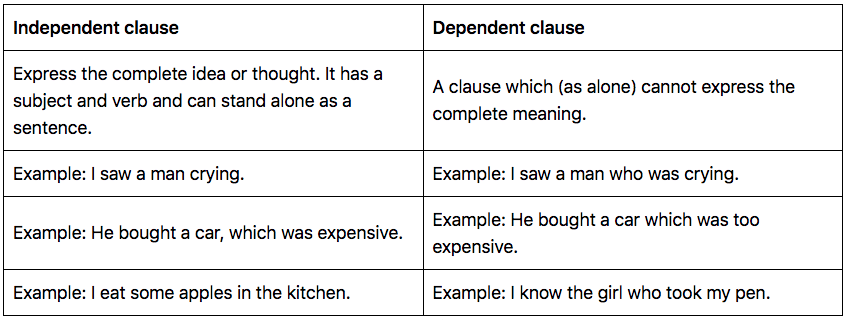

The Merriam-Webster dictionary defines a clause as a group of words accommodating a predicate and a subject serving as a member of a compound or complex sentence. In simpler terms, a clause is made of a group of words that consist of a finite verb and a subject.
A clause generally contains only one verb and one subject. In the clause, the verb needs to be distinguishable and apparent, while the subject can be hidden or mentioned.
| Independent clause | Dependent clause |
| Express the complete idea or thought. It has a subject and verb and can stand alone as a sentence. | A clause which (as alone) cannot express the complete meaning. |
| Example: I saw a man crying. | Example: I saw a man who was crying. |
| Example: He bought a car, which was expensive. | Example: He bought a car which was too expensive. |
| Example: I eat some apples in the kitchen. | Example: I know the girl who took my pen. |
A clause generally makes up one part of a speech. It is a group of words that include a verb and a subject. Although a clause typically includes a verb and a subject, sometimes the verb phrase in a clause is accompanied by other elements. These other grammatical elements can be adjuncts, complements, and objects. In some cases, these elements become necessary to complete the exact meaning of the clause.
See this in a video guide:

A clause is constituted of a collection of words that include a predicament and a subject but cannot always be regarded as a full sentence. Clauses can either be classified as independent (main) clauses or dependent (subordinate) clauses. All the grammar rules of the function and types of clauses have already been thoroughly discussed in the article.
An adverbial clause functions as an adverb in a sentence and is a type of dependent clause. The adverb clauses give information about the purpose, manner, place, time, manner, and many other things in a sentence. There are many types of adverb clauses each with its particular set of functions and common conjunction:
Time
The adverbial clauses expressing time generally include the words, before, until, as long as, after, and while as answers when something happens.
E.g.: They hiked after they ate supper.
Place
The adverbial clause of place, makes use of ‘where’ and ‘wherever’ as its trigger words.
E.g.: The man followed me wherever I went.
Condition
Conditional adverb clauses use subordination conjunctions like lest, provided that, and if to convey the likely result of a situation.
E.g.: We will go to the park if it’s sunny.
A clause is considered to be the basic unit of English grammar. The proper usage and placement of clauses in a sentence improve the quality of writing. Go through the article and learn everything there is to know about the function of clauses.
Adjective clause, adverbial clause, appositive clause, comment clause, comparative clause, concessive clause, conditional clause, contract clause, conditional mood coordinate clause, defining relative clause, dependent clause, finite clause, if clause, independent clause, main clause, nominal clause, non-defining relative clause, non-finite clause.
What is a clause?A clause is a group of words that includes a subject and a verb. The clause functions as one part of speech.
Can a sentence have multiple clauses?Yes. A sentence can have multiple clauses, especially in a complex sentence. Two clauses can appear in a single sentence. Although, it can create a sentence fragment if not used correctly.
Inside this article

Fact checked:
Content is rigorously reviewed by a team of qualified and experienced fact checkers. Fact checkers review articles for factual accuracy, relevance, and timeliness. Learn more.

About the author
Dalia Y.: Dalia is an English Major and linguistics expert with an additional degree in Psychology. Dalia has featured articles on Forbes, Inc, Fast Company, Grammarly, and many more. She covers English, ESL, and all things grammar on GrammarBrain.